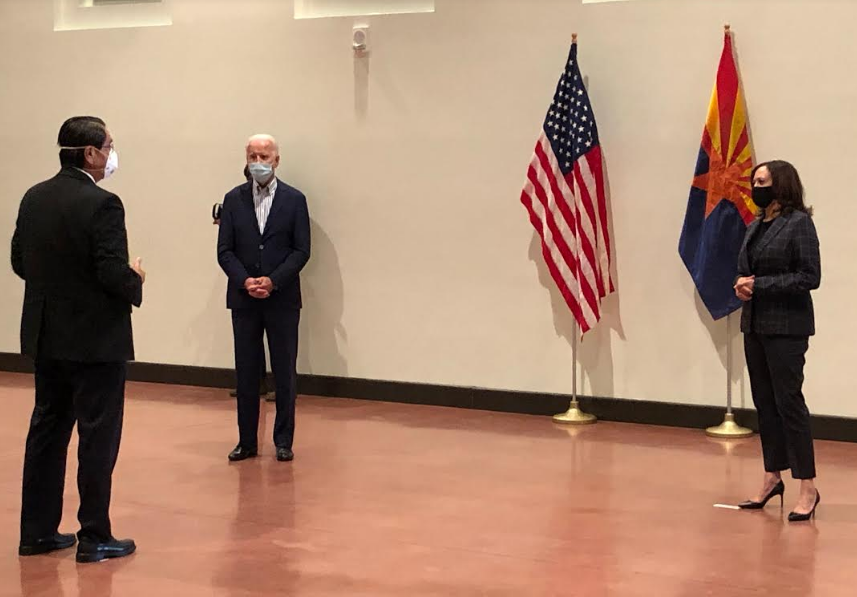
- Details
- By Alina Bykova
WINDOW ROCK, Ariz. – Navajo Nation President Jonathan Nez and Vice President Myron Lizer congratulated the 46th U.S. President Joe Biden and 49th Vice President Kamala Harris in a statement Wednesday.
Biden and Harris were sworn in at the U.S. Capitol on Wednesday afternoon to begin their four-year term at the White House.
“On behalf of the Navajo Nation, I congratulate President Joe Biden and Vice President Kamala Harris on this historic and remarkable day. Across this country, it is time to come together in unity, to heal, and to move forward to build a better future for our children and the generations to come. First Lady Phefelia Nez and I have a very good relationship with President Biden and First Lady Dr. Jill Biden. We are very happy for them and their family, as well as Vice President Kamala Harris and Doug Emhoff,” said President Nez in the statement.
He added, “The Biden-Harris team has laid the foundation to work with tribal nations with the ‘Biden-Harris Plan for Tribal Nations’ that they presented in October. In the midst of a worldwide pandemic we saw Native Americans, especially young voters, turn out in numbers that we have never seen before. The voting power and influence of Native Americans was a key factor in the outcome of the election. Thanks to the organizing from the grassroots level on up, all tribal nations now have a seat at the table. The Navajo Nation will continue to build a strong partnership with the Biden-Harris Administration to empower our Navajo people and all tribal nations in the years to come.”
“We offer our prayers to the Biden-Harris Administration as America continues to move forward. We are confident that God will guide us in these times of change. Over the last few years, I have been honored to have good relations with former President Donald J. Trump, Vice President Mike Pence, and the White House. The Navajo Nation will continue its partnership with our federal partners to enhance the lives and living conditions across the Navajo Nation. Each day, our duty is to place Navajo first. Our message to Wááshindoon centers on our Navajo People. We are indestructible as we have learned in the past, because of our culture and heritage. Resiliency runs deep into our mind, heart, and spirit. The Nez-Lizer Administration has been about ‘Working Together’ since day one. We look forward to working collaboratively with the federal government and congressional leaders on both aisles in Congress,” Vice President Lizer said in the statement.
The statement said that Nez and Lizer watched the inauguration from their respective homes in Window Rock, Ariz., and did not attend the inauguration due to Covid-19 restrictions.
Nez met with Biden and Harris in October and emphasized the need for federal partners to work with the Navajo Nation to “move forward with infrastructure development projects to provide clean water, electricity, broadband, and roads for more Navajo people,” the statement said. “Among other priorities, he also spoke about the need to improve the health care system for tribes to improve health disparities, supporting economic development, educational priorities, remediating uranium mining sites, water rights settlements, solid waste management, and improving public safety.”
On Tuesday, President Nez, First Lady Phefelia Nez, and Miss Navajo Nation Shaandiin Parrish took part in a virtual event to honor and commemorate more than 400,000 American citizens who died from Covid-19.
On Thursday, Jan. 21, President Nez and First Lady Nez will offer a prayer during the 59th Inaugural National Prayer Service, which will be held at 8:00 a.m. MST. President Biden will join the virtual event hosted by the Washington National Cathedral, which will be live streamed at https://bideninaugural.org/watch.
The Biden-Harris Plan for Tribal Nations states that the Biden-Harris administration will work with “over 574 federally recognized Native American tribes in the United States” to strengthen nation-to-nation relationships, address chronic underfunding and health disparities in Indigenous communities, restore tribal lands and safeguard natural and cultural resources, reinstate the annual White House Tribal Nations Conference, appoint Native Americans to high-level government positions, nominate judges who understand federal Indian law, ensure fulfillment of federal trust and treaty obligations, promote meaningful tribal consultation, defend the Indian Child Welfare Act, and strengthen self-governance.
“Joe Biden and Kamala Harris are committed to upholding the U.S.’s trust responsibility to tribal nations, strengthening the Nation-to-Nation relationship between the United States and Indian tribes, and working to empower tribal nations to govern their own communities and make their own decisions,” the plan says.
Help us defend tribal sovereignty.
At Native News Online, our mission is rooted in telling the stories that strengthen sovereignty and uplift Indigenous voices — not just at year’s end, but every single day.
Because of your generosity last year, we were able to keep our reporters on the ground in tribal communities, at national gatherings and in the halls of Congress — covering the issues that matter most to Indian Country: sovereignty, culture, education, health and economic opportunity.
That support sustained us through a tough year in 2025. Now, as we look to the year ahead, we need your help right now to ensure warrior journalism remains strong — reporting that defends tribal sovereignty, amplifies Native truth, and holds power accountable.
 The stakes couldn't be higher. Your support keeps Native voices heard, Native stories told and Native sovereignty defended.
The stakes couldn't be higher. Your support keeps Native voices heard, Native stories told and Native sovereignty defended.
Stand with Warrior Journalism today.
Levi Rickert (Potawatomi), Editor & Publisher
